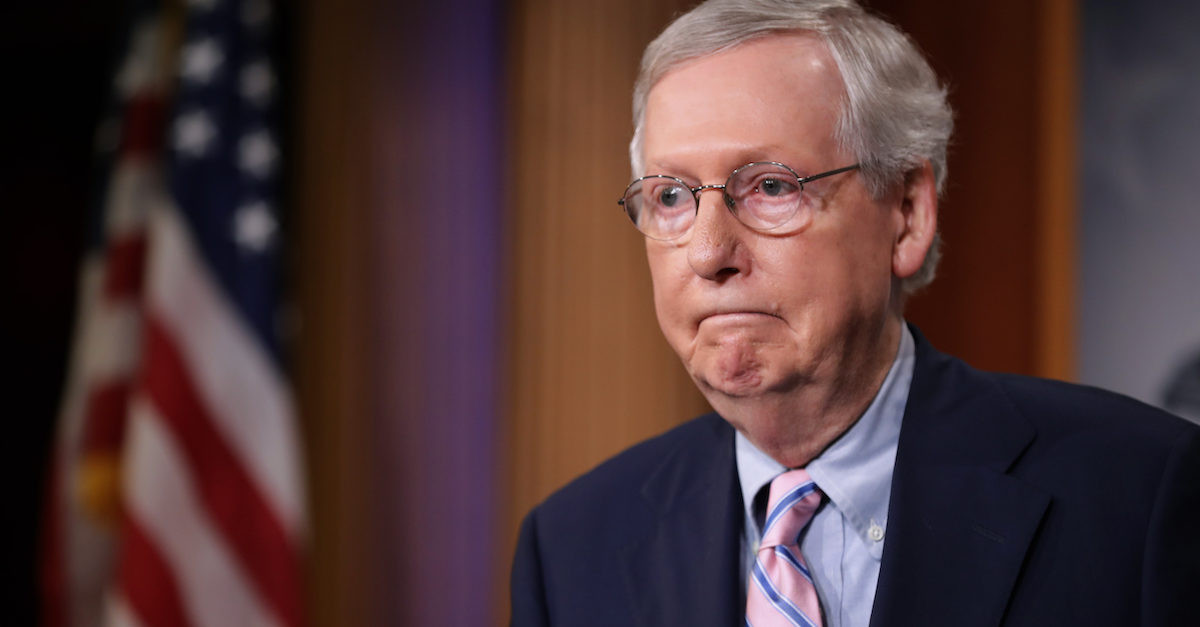
Update, Jan. 21, 8 p.m.: McConnell caved, somewhat.
—
Senate Majority Leader Mitch McConnell (R-Ky.) on Monday evening released Republicans’ proposal for the organizing resolution that will govern the impeachment trial of President Donald Trump — just hours before the historic proceeding is slated to begin on Tuesday. The proposed rules would give Democrats and Republicans each 24 total hours to present their case, split between two days. While many have criticized the condensed timeframe, the most notable aspect of the resolution may be its treatment of the evidence collected by House investigators’ impeachment inquiry, which will not automatically be part of the trial record.
The resolution requires the House to file its record – which includes “transcripts of public hearings” and “mark-ups of any materials printed by the [House] or Judiciary Committee” with the Secretary of the Senate.
The aforementioned materials will only be admitted into evidence “after the Senate has disposed of the question of whether it shall be in order to consider and debate under the impeachment rules any motion to subpoena witnesses or documents,” the resolution stated.
This is a drastic divergence from McConnell’s statements about conducting the trial under the same rules that governed President Bill Clinton’s impeachment trial.
“All we are doing here is saying we are going to get started in exactly the same way 100 senators agreed to 20 years ago,” McConnell said earlier this month. “What was good enough for President Clinton is good enough for President Trump.”
The conspicuous alteration was not overlooked by legal and political experts.
“BIG change from the Clinton Rules: Info and testimony collected by the House is NOT AUTOMATICALLY evidence in the Senate,” CNN legal analyst, attorney and impeachment expert Ross Garber noted. “There would have to be a motion to admit this evidence AFTER a vote on the question of subpoenaing additional witnesses and info.”
“McConnell Rules basically: OPTION 1: all House info is evidence but no new subpoenas will be issued (and have a quick process) or,” Garber continued. “OPTION 2: new subpoenas may be issued, but House will have to meet evidentiary standards for all info, like at a regular trial (long, hard process).”
Attorney David Lurie said the rule made “even more of a mockery” out of the GOP’s proposed trial rules, saying that the “entire premise of Clinton proceedings was that Senate was accepting Starr materials as evidence in lieu of having evidentiary proceedings in Senate.”
“Theoretically, there could be no evidence admitted by Senate, correct?” he asked.
“I think that’s going to ultimately be the deal here too,” Garber answered.
“It of course should not be a ‘deal.’ There is no even remotely reasoned basis for having a non-evidentiary proceeding if the existing evidence might be excluded. No wonder McConnell hid his ‘rules,’ since his claim to adhering to precedent is, as per usual, false,” Lurie responded.
Also highlighting the changes from the Clinton impeachment rules, former Clinton White House press secretary Joe Lockhart accused McConnell of engaging in a “cover up.”
“The cover up rules from McConnell bear no resemblance to the Clinton rules. Cue up the tape of the 300 times he said this would be by the Clinton rules. A lie each and every time. The very first vote will tell us if 4 Republicans have a soul and still put their country first,” Lockhart said.
[image via Chip Somodevilla/Getty Images]
Have a tip we should know? [email protected]